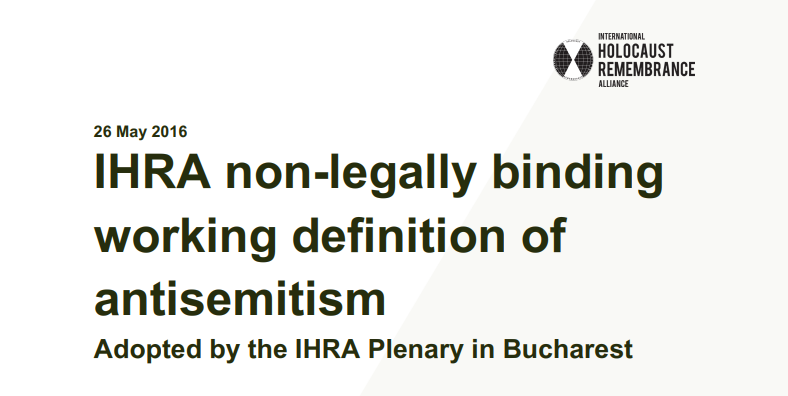
Working definition of antisemitism
Read the full text of the IHRA’s non-legally binding working definition of antisemitism and learn more about this important tool with the related resources and FAQs below.
Our working definitions are available in multiple languages. While we try to ensure the accuracy of all of our translations, in the event of any discrepancies, the English translation takes precedence.
In the spirit of the Stockholm Declaration that states: “With humanity still scarred by …antisemitism and xenophobia the international community shares a solemn responsibility to fight those evils” the committee on Antisemitism and Holocaust Denial called the IHRA Plenary in Budapest 2015 to adopt the following working definition of antisemitism.
On 26 May 2016, the Plenary in Bucharest decided to:
Adopt the following non-legally binding working definition of antisemitism:
“Antisemitism is a certain perception of Jews, which may be expressed as hatred toward Jews. Rhetorical and physical manifestations of antisemitism are directed toward Jewish or non-Jewish individuals and/or their property, toward Jewish community institutions and religious facilities.”
To guide IHRA in its work, the following examples may serve as illustrations:
Manifestations might include the targeting of the state of Israel, conceived as a Jewish collectivity. However, criticism of Israel similar to that leveled against any other country cannot be regarded as antisemitic. Antisemitism frequently charges Jews with conspiring to harm humanity, and it is often used to blame Jews for “why things go wrong.” It is expressed in speech, writing, visual forms and action, and employs sinister stereotypes and negative character traits.
Contemporary examples of antisemitism in public life, the media, schools, the workplace, and in the religious sphere could, taking into account the overall context, include, but are not limited to:
- Calling for, aiding, or justifying the killing or harming of Jews in the name of a radical ideology or an extremist view of religion.
- Making mendacious, dehumanizing, demonizing, or stereotypical allegations about Jews as such or the power of Jews as collective — such as, especially but not exclusively, the myth about a world Jewish conspiracy or of Jews controlling the media, economy, government or other societal institutions.
- Accusing Jews as a people of being responsible for real or imagined wrongdoing committed by a single Jewish person or group, or even for acts committed by non-Jews.
- Denying the fact, scope, mechanisms (e.g. gas chambers) or intentionality of the genocide of the Jewish people at the hands of National Socialist Germany and its supporters and accomplices during World War II (the Holocaust).
- Accusing the Jews as a people, or Israel as a state, of inventing or exaggerating the Holocaust.
- Accusing Jewish citizens of being more loyal to Israel, or to the alleged priorities of Jews worldwide, than to the interests of their own nations.
- Denying the Jewish people their right to self-determination, e.g., by claiming that the existence of a State of Israel is a racist endeavor.
- Applying double standards by requiring of it a behavior not expected or demanded of any other democratic nation.
- Using the symbols and images associated with classic antisemitism (e.g., claims of Jews killing Jesus or blood libel) to characterize Israel or Israelis.
- Drawing comparisons of contemporary Israeli policy to that of the Nazis.
- Holding Jews collectively responsible for actions of the state of Israel.
Antisemitic acts are criminal when they are so defined by law (for example, denial of the Holocaust or distribution of antisemitic materials in some countries).
Criminal acts are antisemitic when the targets of attacks, whether they are people or property – such as buildings, schools, places of worship and cemeteries – are selected because they are, or are perceived to be, Jewish or linked to Jews.
Antisemitic discrimination is the denial to Jews of opportunities or services available to others and is illegal in many countries.
Featured download
Download the full text of the IHRA’s working definition of antisemitism.

Frequently asked questions
Why was the IHRA working definition of antisemitism developed?
The IHRA is the only intergovernmental organization mandated to focus solely on Holocaust-related issues. With evidence that the scourge of antisemitism was once again on the rise, we resolved to take a leading role in combating it.
Combating antisemitism requires international cooperation among experts, governments, and civil society, which meant a mutual starting point for discussion and action was needed. Following the example of the working definition of Holocaust denial and distortion (2013), the IHRA’s experts set out to adopt a similar tool to help guide the organization’s work on combating antisemitism.
How did the IHRA adopt the working definition of antisemitism?
The experts in the IHRA’s Committee on Antisemitism and Holocaust Denial built international consensus around a non-legally binding working definition of antisemitism, which was then adopted by the Plenary, the IHRA’s decision-making body made up of representatives from all IHRA Member Countries. By doing so, the IHRA provided an important practical tool for its Member Countries.
What has its impact been?
The working definition of antisemitism has brought the issue once more to the attention of leaders around the world, making them aware that much work still needs to be done to address antisemitism, which is deeply rooted in our societies.
As a result, countries and organizations have developed national and regional strategies to counter antisemitism, and have appointed Special Envoys and other advisors on the issue. The working definition has helped educate and sensitize administrations, politicians, judges, police, teachers, media, and civil society.
Its broad international implementation has allowed monitoring organizations to better track antisemitism across borders, and has provided researchers and civil society organizations with a way to better moderate content online, including by training AI tools.
Who has adopted the working definition of antisemitism?
The working definition has helped guide countless governments, organizations, and individuals in their efforts to identify antisemitism. This practical tool has also been formally adopted or endorsed* by these groups, both at the national and organizational level.
National level
The following UN member states have adopted or endorsed the IHRA working definition of antisemitism. In addition, a wide range of other political entities, including a large number of regional/state and local governments, have done so as well. Depending on their domestic situation, countries may use different terminology, including adopt, endorse, embrace, recognize, support, and so on.
Albania (22 October 2020)
Argentina (4 June 2020)
Australia (13 October 2021)
Austria (25 April 2017)
Belgium (14 December 2018)
Bosnia (22 July 2022)
Bulgaria (18 October 2017)
Canada (27 June 2019)
Colombia (2 June 2022)
Croatia (20 January 2023)
Cyprus (18 December 2019)
Czech Republic (25 January 2019)
Denmark (January 2022)
Estonia (29 April 2021)
Finland (17 February 2022)
France (3 December 2019)
Germany (20 September 2017)
Greece (8 November 2019)
Guatemala (27 January 2021)
Hungary (18 February 2019)
Ireland (16 January 2025)
Israel (22 January 2017)
Italy (17 January 2020)
Latvia (11 April 2023)
Lithuania (24 January 2018)
Luxembourg (10 July 2019)
Moldova (18 January 2019)
Netherlands (27 November 2018)
North Macedonia (6 March 2018)
Panama (10 May 2023)
Philippines (18 February 2022)
Poland (13 October 2021)
Portugal (28 July 2021)
Romania (25 May 2017)
Serbia (26 February 2020)
Slovakia (28 November 2018)
Slovenia (20 December 2018)
South Korea (4 August 2021)
Spain (22 July 2020)
Sweden (21 January 2020)
Switzerland (4 June 2021)
United Kingdom (12 December 2016)
United States (11 December 2019)
Uruguay (27 January 2020)
Organizations
The following international organizations have expressed support for the working definition of antisemitism:
United Nations
- Secretary General Antonio Guterres acknowledged the efforts of the IHRA Member Countries to agree on a common definition of antisemitism and underlined that it could serve as a basis for law enforcement, as well as preventive policies.
- Special Rapporteur for freedom of religion or belief Ahmed Shaheed recommended that governments use the IHRA working definition of antisemitism as a non-legally binding educational and training tool and ensure it is incorporated, together with relevant human rights standards-based guidance on protecting freedom of opinion and expression, into training and educational materials for all public officials, such as police, prosecutors, and judges, government employees, educators, and national human rights institutions, and integrated into diversity inclusion programs.
European Union
- Council and Parliament called on Member States that had not done so already to endorse the non-legally binding working definition of antisemitism employed by the International Holocaust Remembrance Alliance (IHRA) as a useful guidance tool in education and training, including for law enforcement authorities in their efforts to identify and investigate antisemitic attacks more efficiently and effectively.
- Commission highlighted the working definition of antisemitism by the International Holocaust Remembrance Alliance as the benchmark for developing a victim-centered approach and urged for its adoption.
Organization of American States
- Secretary General Luis Almagro asked every member state to adopt the working definition and announced it would be employed to guide OAS work.
Council of Europe
- European Commission against Racism and Intolerance welcomed the non-legally binding IHRA working definition of antisemitism in the sense that it aids and promotes a better understanding of antisemitism. It considered that it can be a positive tool and encouraged Council of Europe member states to take it into account, in particular in the areas of data collection, education, and awareness-raising.
PARLASUR
- The Parliament of MERCOSUR approved a proposal endorsing the IHRA working definition of antisemitism during its LXXXIII Ordinary Session on 11 November 2022.
* Different countries and organizations will use different terminology, including adopt, endorse, embrace, recognize, support, and so on.
Sign up to our newsletter to
receive the latest updates
By signing up to the IHRA newsletter, you agree to our Privacy Policy





